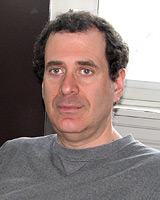
Jody Azzouni is a poet who works within his own limitations. This accomplished bard and Philosophy professor at Tufts University believes we can’t see these limits because of our own “blind spots.” And like many writers, Azzouni does quite well within the confines of his own limits.
Azzouni has been writing since he was twelve: Poetry, Fiction, Philosophy. He’s been a professor in the Philosophy Department at Tufts University since 1986, and lives in Somerville. His most recent book of poetry is “Hereafter Landscapes,” published with the Poet’s Press. I talked with him on my Somerville Community Access TV Show: ” Poet to Poet: Writer to Writer.”
Doug Holder: You describe yourself as a “New Yorker.” Define that.
Jody Azzouni: The first thing I would say about it is that involves a lot of caffeine. There is a high speed element to being a New Yorker. You move more quickly–you react quickly–even if you don’t show it. So I see that as an essential element of my personality. That’s a more positive thing than saying I have a Attention Deficit Disorder.
DH: In your view, according to one of your philosophy books: Talking About Nothing: Numbers, hallucinations and fictions much that we talk about in poetry and fiction as well as mathematics and science doesn’t exist in any sense at all. Explain.
JA: The easiest examples are fictional characters. They don’t exist. I also make strange claims. As a philosopher I believe there are no mathematical objects. Yet mathematics is indispensable to the sciences. It shows up everywhere. And yet I claim none of those mathematical terms refer to anything. So in many cases we use things that are not real, to get at things that are real in an indirect way. It is hard too do it directly. Either because what we are trying to get to is too complicated or because we don’t know enough about it. Like when we talk about dreams–we are not talking about real events; we are actually talking about certain psychological events or neurological events. We are talking about it in a way we have access to it.
DH: You teach Philosophy at Tufts University, and you are a published poet. Does your academic calling weave into your poetry?
JA: Not really. At least not that I am aware of. It is one person, me, who is writing the short stories, another person who is writing the poetry and another the philosophy. There must be some continuity but I am not aware of it. When I sit down to write a poem I am not thinking about philosophy–although philosophical ideas come up.
DH: Is poetry more intuitive than philosophy?
JA: Officially speaking yes. But the way I do it– no. Instinct shows up in both fields for me. Craft and the same mixture of conscious and unconscious elements appear.
DH: You say you don’t incorporate your past in your poetry. How can you avoid this?
JA: In some sense I am incorporating my memories. What I am not doing is something largely autobiographical. I don’t tell stories or borrow characters from my past, etc… I make up a lot of stuff. I am more like a dramatic poet who is masquerading as a Confessional poet. A lot of my poems that I write are in the first person. I am a Dramatic Confessional poet I suppose. I act. I like to do this because I really like to get into different sensibilities.
DH: You say we all work within our limitations. What are yours?
JA: I am the wrong person to ask. I work within them so I really can’t see them. We all have blind spots. Like in John Cheever’s short stories, I noticed that nobody seems to be friends-no discussion of friends. This is a dimension that does not seem to be part of his work. Whether Cheever knew this or not I have no idea. But with most writers–they can’t say which element is missing. Sometime this limitation can make the work unusual. I feel Kafka’s writing has many limitations–but that is what makes it unusual.














Reader Comments